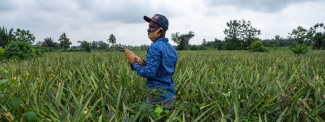Originally published by the OECD Development Matters blog on 28th July 2023
Of the 46 least developed countries (LDCs), 16 are at different stages of graduation. And, though graduation offers many opportunities, it also presents its own unique challenges for countries in this category. As such, various international support measures (ISMs) have been put in place, or extended, to ensure smoother transitions and sustained developmental progress in the post-graduation phase.
Two key concerns for LDCs following graduation involve: preferential market access for export, and development assistance, such as concessional financing.
In the areas of market access, LDCs are concerned about preference erosion following their graduation. However, a recent analysis shows that only a handful of LDCs, led by Bangladesh, have managed to effectively utilise these trade preferences. For countries such as Angola, Kiribati, Sao Tomé and Principe, Timor-Leste, Tuvalu, and Vanuatu, where the share of exports that use preference is less than 5% - the impact on their exports will likely be negligible.
In the area of development cooperation, the LDCs have expressed concerns about the potential loss of concessional financing following their graduation. However, here too, analysis shows that many multilateral donors, such as the World Bank and regional development banks, consider among others, income criteria rather than LDC criteria for such financing.
Mitigating measures
To help ensure a smooth transition, however, several mitigation measures are available to recently graduated countries and those in the process of graduation.
In the area of trade, for example, many graduating LDCs are working to enhance their productive capacity and reduce their trade costs. This will eventually make their exports more competitive in the global market, reducing their reliance on trade preferences.
While country‑specific examples are discussed below, some of the regional initiatives such as the United Nations Economic and Social Commission for Asia and the Pacific (UNESCAP)'s Framework Agreement on Cross-border Paperless Trade can also be extremely helpful - not only in reducing trade costs, but also in securing trade gains.
Based on a study conducted by UNESCAP, the Table below shows that countries such as Bhutan and Cambodia can significantly reduce time and costs of trading by fully implementing this Framework thereby reaping impressive trade gains. Benefits to other countries too are non-trivial.
Table: Gains from full implementation of cross-border paperless trade in Asian graduating LDCs

Source: UNESCAP (accessed 26 June 2023).
In the area of finance, mobilising private investment, including foreign direct investment (FDI) could help mitigate the impact of reduced concessional financing. Realising this, the Enhanced Integrated Framework and World Association for Investment Promotion Agencies have launched a capacity‑building programme initially targeting graduating countries in the Asia‑Pacific region. The initiative has helped participants from skills development through to offering networking opportunities.
Stories from countries
In Vanuatu, which graduated in 2020, the Electronic Single Window System (ESWS) initiative, launched in 2016, helped reduce processing times for the issuance of biosecurity certificates from four to six days to as little as 10 minutes.
At the same time, Vanuatu’s Department of Customs and Inland Revenue reported an impressive increase in revenue collection, from around US$33 million in 2016 to a current value of US$134 million since the implementation of the ESWS. Impressed with the success of the initiative, Vanuatu's Parliament recently approved budget for the next phase of the project.
In Bhutan, which is graduating this year, the Department of Industry developed and launched an e-regulation portal containing trade‑investment‑ and construction-related information and procedures on a single site. Representing a serious effort to enhance the transparency of investment rules and procedure, the portal is also included on the websites of Bhutanese missions and embassies abroad.
Even though the portal was launched during the COVID-19 pandemic, between its launch in November 2020 and August 2022, the Department was able to swiftly approve 104 domestic and FDI investment projects worth US$365 million.
In Cambodia, which met the graduation criteria in 2021, the Rectangular Strategy – Phase IV, a part of the National Strategic Development Plan (2019- 2023), envisions the signing of free trade agreements with various trading partners and blocs – to address preference erosion resulting from the country's LDC graduation. Accordingly, Cambodia ratified the Regional Comprehensive Economic Partnership Agreement in 2022.
Bilateral free trade agreements signed with China came into force in January 2022 and one with Republic of Korea became effective since December 2022. Finally, Cambodia concluded the Comprehensive Economic Partnership Agreement with the United Arab Emirates on 27 April 2023.
Last but not least, for Senegal, which met the graduation criteria in 2021, the African Continental Free Trade Area (AfCFTA) Agreement can provide a cushion against potential loss of preferences. Accordingly, the country has adopted its National AfCFTA Strategy (2020-2024) aimed at contributing to the achievement of the Senegal Emerging Plan (2019-2035) through the promotion of sectors driving growth, exports, and social inclusion.
According to the relative ranking of countries on the implementation AfCFTA Senegal ranks 8th out of 54 countries in the Continent and ranks first amongst 33 LDCs. It is not only one of the first countries to have validated AfCFTA national implementation strategy but also among a handful of countries to have digitised customs procedures by putting in place an electronic single window.
To conclude, the real test towards smooth transition lies in countries' ability to not only design LDC transition strategies, but also to implement priorities identified with or without support from development partners. It is clear that those that have a head start in these areas are likely to fare better overall than late starters.
[The author would like to acknowledge valuable comments from Roland Mollerus (UNDESA), Stephen Fevrier, Taufiqur Rahman (WTO) and Hang Tran, Simon Hess, and Paulin Zambelongo (EIF)].
If you would like to reuse any material published here, please let us know by sending an email to EIF Communications: eifcommunications@wto.org.



